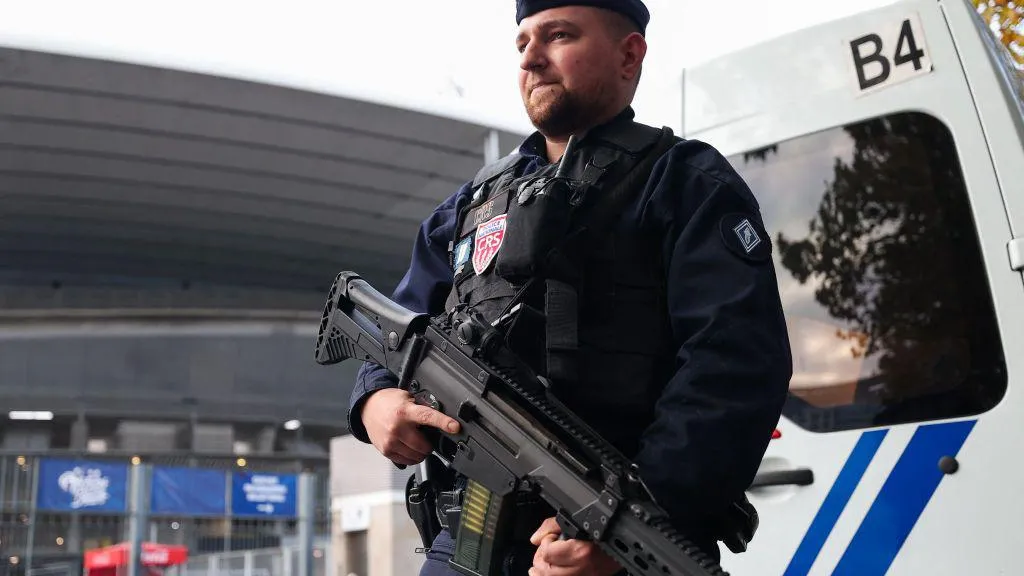France mounts security operation for Israel match after Amsterdam violence
4 min read
France is deploying an extensive security operation in Paris for Thursday’s international football match between France and Israel, following a violent episode in Amsterdam last week. The attack on Maccabi Tel Aviv fans has intensified concerns over potential violence at the match, which is now under close scrutiny due to the tense geopolitical climate.
Paris police chief Laurent Nuñez announced that 4,000 officers would be mobilized across the capital and surrounding areas, with 2,500 of those stationed at the Stade de France in the northern suburbs, the venue for the match. An additional 1,600 private security guards will be stationed at the stadium, and an elite anti-terrorist police unit will be tasked with protecting the visiting Israeli team. “This is a high-risk match due to the extremely tense geopolitical context,” Nuñez stated, emphasizing that authorities would not tolerate any attempts to disturb public order during the event.
The Uefa Nations League game, set to kick off at 20:45 (19:45 GMT), is under heightened security after violent clashes in Amsterdam following the Ajax vs. Maccabi Tel Aviv match last Thursday. In the violence, Israeli fans were chased through the streets by rioters, sparking renewed concerns over rising antisemitism in Europe. In the aftermath, both Jewish and Palestinian groups were involved in clashes, with Maccabi Tel Aviv fans being accused of vandalizing property and inciting violence before being targeted by local rioters.
To prevent a similar situation in Paris, security measures have been ramped up. The Stade de France, which holds 80,000 spectators, is expected to be less than a quarter full for the match. At the request of the Israeli government, only around 100 Israeli fans are expected to attend, though other Israeli supporters might also be present. French authorities are urging fans to undergo identity checks ahead of the game, and nearby bars and restaurants have been instructed to close early in the day.
In a gesture of solidarity following the violence in Amsterdam, French President Emmanuel Macron will attend the match, accompanied by Prime Minister Michel Barnier and former presidents François Hollande and Nicolas Sarkozy. This decision comes amidst growing concerns over tensions between pro-Israeli and pro-Palestinian groups, both in France and across Europe. Macron’s participation signals the French government’s firm stance against the spread of hate and violence in the wake of the ongoing Middle East conflict.
The violence from last week’s events in Amsterdam has been part of a larger, worrying trend. In recent years, Europe has seen a rise in antisemitic incidents, particularly as tensions between Israel and its neighbors have escalated. France, in particular, has a large Muslim population that often voices solidarity with Palestinians, while its Jewish community strongly identifies with Israel, leading to tensions that have spilled into public protests and violence.
In the political arena, some factions have voiced opposition to the match. France’s far-left political party, France Unbowed (LFI), which has been outspoken in its criticism of Israeli policies, has called for the match to be canceled or for President Macron to refuse to attend. LFI deputy David Guiraud criticized Macron for supporting a country that he accused of committing “genocide.” Israel has denied these allegations, calling them baseless and distorted.
Despite these calls for cancellation, French Interior Minister Bruno Retailleau dismissed any suggestion of moving or canceling the match. “France does not give way to those who sow hatred,” he said, affirming the government’s stance on upholding public order and security.
Meanwhile, tensions between President Macron and Israeli Prime Minister Benjamin Netanyahu have become more strained in recent weeks. Macron has accused Netanyahu of spreading “barbarism” in Gaza and Lebanon, while some Jewish communities in France expressed frustration with Macron’s comments about the Israeli government’s stance on the conflict. Macron also angered Israeli officials when he suggested that Israel should accept a ceasefire, citing the UN’s role in the creation of Israel. This was viewed by many in Israel as an affront to the country’s sovereignty and a betrayal of the Jewish state’s right to defend itself.
The match also comes at a time when diplomatic relations between France and Israel are increasingly polarized. The recent detainment of two French officials in East Jerusalem added further strain to the relationship. Macron’s foreign policy has been described as inconsistent, with critics accusing him of flip-flopping between support for Israel and Arab nations in the Middle East.
As the match approaches, protests are expected to take place in Paris, with both pro-Palestinian and anti-racist groups planning demonstrations. The political and social implications of the game are expected to extend far beyond the football pitch, as tensions between competing political factions in France and broader geopolitical forces continue to play out.
With thousands of officers and private security guards in place, France is doing everything it can to ensure the match remains peaceful. However, the intense emotions surrounding the game underscore the broader challenges of managing rising political tensions in Europe amid the ongoing Middle East conflict. The result of the game may be less significant than the broader political stakes involved.





